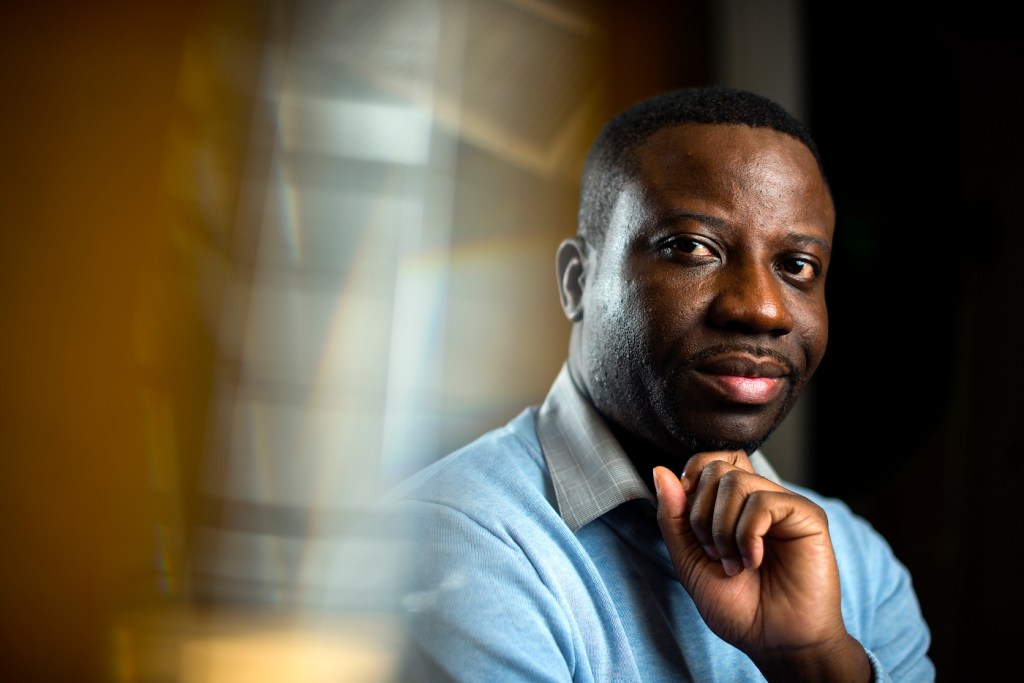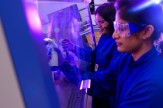Math professor named Next Einstein Fellow

When Jonathan Mboyo Esole was 2-and-a-half years old, he had a near-death experience.
“I had a heart condition and the doctor told my parents, ‘Your child is gone,’” recalled Esole, now assistant professor in the College of Science. But for the first of many times time to come, he proved to be an anomaly.
Esole survived that close call. However, the experience had some lingering effects on his language development. As a kid, he attended supplementary programs to catch up with his peers and started reading books at home. One of them was about Albert Einstein.
“It said, this is the smartest guy in the world, and he used to have some problems at school as well,” Esole recalled. “That story is not completely accurate, but it definitely worked for me.” Esole explained that reading that book on Einstein made him realize that he could still succeed in math and science despite his language development challenges. And that’s what he did.
Now, years after he was first inspired by the famous physicist, Esole is an accomplished mathematician himself. And he has just been named a Next Einstein Fellow, an award that recognizes Africa’s best young scientists and technologists.
Exceptionally bright beginnings
Esole was born in the Democratic Republic of the Congo. At age 3, he and his brothers and sister moved with their parents to Brussels, Belgium where Esole’s father was pursuing his doctorate in philosophy and anthropology. Esole returned to the Congo for elementary and high school. Before completing senior year, all students had to take a final state exam. Esole earned the second highest score in the country for mathematics and physics.
Esole went on to study at some of the most prestigious institutions in the world, where he tackled some of the world’s most complicated math problems. For his senior thesis at the University of Brussels, Esole solved a 25-year-old physics problem by turning it into a math equation. This earned him the award for best thesis in the sciences, which he leveraged to achieve a scholarship to the University of Cambridge.
During his time at Cambridge, Esole’s father died. “That was a difficult year,” Esole said. He needed a change of scenery, so he traveled to the Netherlands to pursue his doctorate. His academic focus was math, but his faculty supervisor was a cosmologist. Together, they started working on another old physics question that had to do with a feature of super gravity called cosmic strings.
“They’re lines of energy across the universe in a theory that is a little bit mathematically complicated,” Esole said. Being a mathematician, he turned the question into a problem of geometry. And one day, he discovered the solution. “It was so simple that I was almost embarrassed we didn’t think about it before,” Esole said.
Globetrotting
After completing postdoctoral research and studying as a visiting student at Stanford University, Esole accepted a three-year fellowship to join the mathematics department at Harvard. There, he had the opportunity to design and teach courses for the first time.
“I think of my students more as collaborators,” Esole said. “They learn from me, but I believe I learn much more from them.”
After his fellowship was over, Esole entered the job market. He was looking for a tenured-track position in one of the most competitive areas of math: string theory, a field that seeks to answer fundamental physics questions. He found the perfect fit at Northeastern. Since arriving in fall 2016, Esole has taught calculus and mathematical methods of quantum mechanics.
“I really love the university. It has this point of view that we are going for greatness, and that’s also how I live my own life,” Esole said.
The Next Einstein award will allow Esole to travel to Africa, initiate projects in the community, and work directly with students. He wants to bring cutting-edge research opportunities back to his home continent. But he also wants to highlight the incredible work in science and technology that African scholars are already producing.
“I want people to change their point of view that Africa is only a place waiting for help,” Esole said. “The continent’s people can help themselves pretty well, and they have a lot to offer.”





